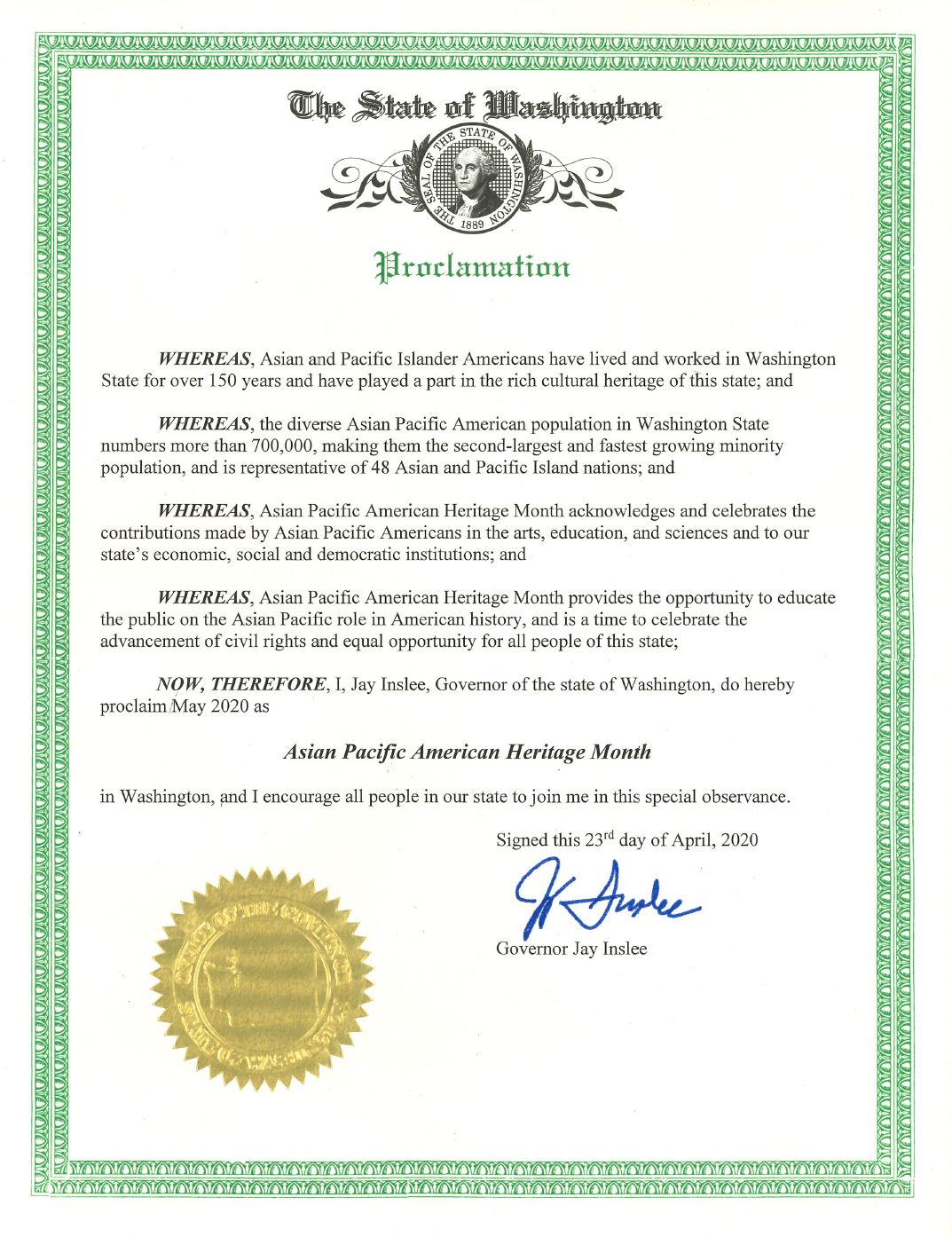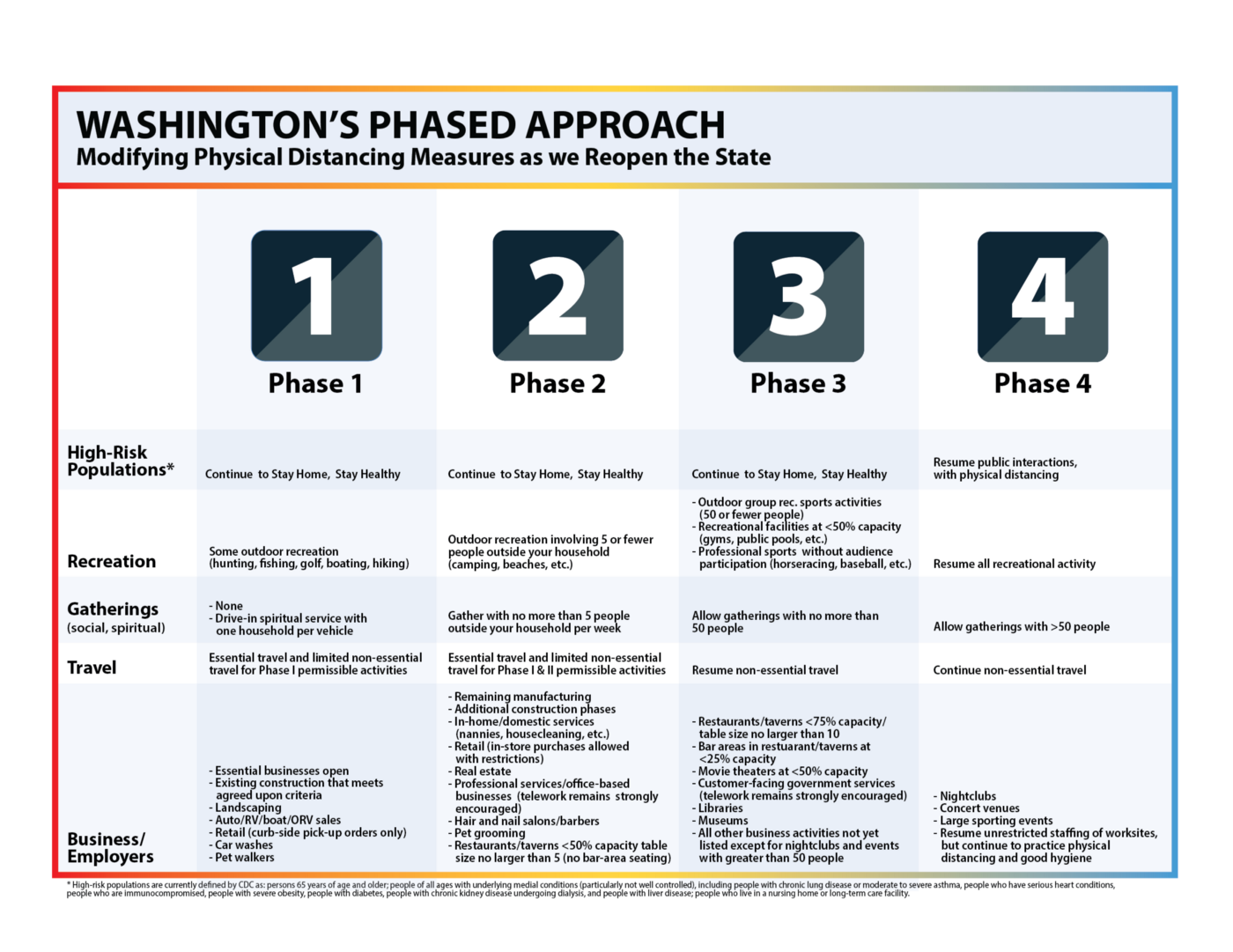Asian and Pacific Islander Americans have shaped our history, culture, economy, political system, and identity. As much as we’ve contributed to our beloved state, we’re also facing renewed challenges in light of COVID-19. This month is a time to reflect upon our roots, be reminded of our histories, and re-commit to having an active role in shaping our path for tomorrow.
Throughout this month, we’ll be shining a light on APA heritage and history, as well as celebrations of community and culture. Follow on our Facebook through #WAAPAHM for the latest information on celebrations, APA history, and more. And, for APAHM resources and educational materials, feel free to visit our web page at: https://capaa.wa.gov/apa-heritage-month/. We’ll be updating it on a regular basis, so send your opportunities and resources our way!

Governor Inslee recently laid out his Safe Start plan for a phased re-opening of the state’s economy. Currently, Washington is in Phase 1, with construction and other essential activities now underway. Incremental additions to sanctioned activities, such as outdoor activities and additional sales and retail, began Tuesday, May 5. When the state moves to Phase 2, all components of Phase 1 will continue.
For more information on the individual phases of the plan, read the plan here. Traditional and Simplified Chinese translations are available on our website, courtesy of Chinese Information and Service Center (CISC).

Governor Inslee recently announced the Washington State Novel Coronavirus (COVID-19) Response Language Access Plan ensure state agencies can provide vital COVID-19 information to individuals with disabilities and with limited English proficiency.
CAPAA is proud to have contributed to this plan, which was created in response to the community’s outcry for better access to translated materials and interpretation services. All agencies must immediately take steps to implement the plan, which consists of three primary components:
- Identifying “vital resources” related to COVID-19 and having them translated into the top 37 languages spoken in Washington State, including 23 commonly spoken APA languages.
- Establishing phone interpretation services for those calling in and needing in-language support
- Creating a multi-lingual employee pool, and seeing staff financially compensated for providing translation and interpretation services.
This is a monumental step for Washington State in improving access to government resources, particularly during the COVID-19 crisis, and addressing the deepening difficulties we’ve heard our communities are experiencing. You can read the full plan here.
Gov. Jay Inslee today announced members of Safe Start advisory groups with focus on health systems readiness, social supports and safe return to work. Each advisory group constitutes a forum for the community to consult with the governor’s office and state agencies on next steps as Washington moves forward. The members of these community leader groups are in touch with communities around the state and will inform decision-making.
Read about the three groups and their members on the governor’s Medium page.
As we continue to deal with the public health crisis and its impact, CAPAA is compiling resources to help our communities. Visit our COVID-19 Resources page and follow us on Facebook via #CAPAAcovid for the latest news and resources regarding COVID-19 in our state. You can also visit www.coronavirus.wa.gov for an exhaustive list of resources.
Some recent developments include:
- Drive in Wifi Hotspots: The Washington State Broadband Office just announced over 300 drive-in Wi-Fi hotspots throughout the state. Some sites also offer indoor public access during business hours. Everyone using the sites – outside or inside – must practice social distancing and hygiene precautions, including staying in your vehicle or at least six feet from other users and wearing a mask if necessary. A map of hotspots is available here and will update as more sites come online.
- Rent and Energy Assistance for Low-Income Households: The Department of Commerce is providing up to $1,000 in rental assistance and up to $500 in energy assistance for households that qualify for the federal Low-Income Home Energy Assistance Program (LIHEAP). To qualify for the COVID-19 crisis LIHEAP benefits, a household must be at 125% of the federal poverty level and have received – or will receive – a LIHEAP or Low Income Rate Assistance Program (LIRAP) benefit in the current program year (October 2019 – October 2020). In 2019, a family of four, with an annual income of $32,188, or a monthly income of $2,682, qualified for the program. See LIHEAP Eligibility Guidelines for more information. To see if you qualify, contact your local community action agency. For more information, read the Department of Commerce’s full press release here.
- Small Business Resiliency Assistance: The state ethnic commissions are partnering with the state Department of Commerce to provide linguistically and culturally appropriate technical assistance to for small business owners from culturally and historically disadvantaged communities. If your business has been affected by the COVID pandemic and you need help identifying next steps, you can contact one of the organizations listed on this site to email or speak with a business coach.
- Unemployment Law Project webinars: If you have questions on unemployment, the Unemployment Law Project is hosting webinars and has resources in Korean, Vietnamese, Chinese, Tagalog, Hindi, and Laotian.
- Equity Matters in Journalism: We are seeing racial disparities play out in real time in the light of this crisis. To combat these issues, Equity Matters is compiling racial equity focused articles from journalists of color, tackling issues that our communities are seeing.
- Local governments poised to receive nearly $300 million in coronavirus relief: A frequently-asked-questions document is available here. More information on CARES Act funds in Washington state is on the Commerce website.
American Red Cross – Community Blood Drives (Seattle) – Sales & Event Coordinator
Kitsap Mental Health Services (Bremerton) – Administrative Assistant – Medical Services.

